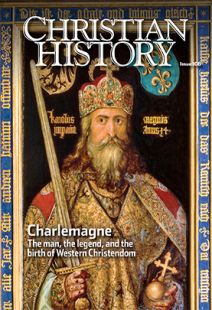Eriugena
WE KNOW VERY LITTLE about Johannes Scottus Eriugena (c. 815–c. 877)—a fact that led twelfth-century historian William of Malmesbury to embellish the record with several fantastic stories, including one describing Eriugena’s students stabbing him to death with their pens!
Other than his Irish birth (as indicated by his surname, meaning “Ireland-born”), Eriugena’s life is a mystery until 843 when he appeared at the court of Charlemagne’s grandson, Charles the Bald (reigned 843–877). Charles soon made Eriugena the head of the palace school, a position recently held by Alcuin of York. There was a notable intellectual continuity between the two men and their circles of colleagues; like Alcuin before him, Eriugena was thoroughgoing in his application of logic and philosophy to Christian theology. In his commentary on the book of Mark, he stated, “No one enters heaven except through philosophy.”
Described by his contemporaries as a holy man and a scholar, Eriugena’s knowledge of Greek enabled him to translate many Greek Christian Neoplatonic writers. Among these were Gregory of Nyssa, Maximus the Confessor, and Pseudo-Dionysius the Areopagite.
As he made their work accessible to the intellectuals of his day, Eriugena came to hold some controversial views, such as the belief that sin and hell were not real because nothing evil could come from God. But he was nonetheless influential in the development of medieval theology and philosophy. His writings and translations were copied and widely distributed during and after his lifetime.
By Jennifer Awes Freeman
[Christian History originally published this article in Christian History Issue #108 in 2014]
Next articles
Broken images
How Charlemagne and the Byzantine Empire misunderstood each other
Jennifer Awes FreemanAfter Christendom, what next?
A modern theologian reflects on where Christendom is today
D. Stephen Long



